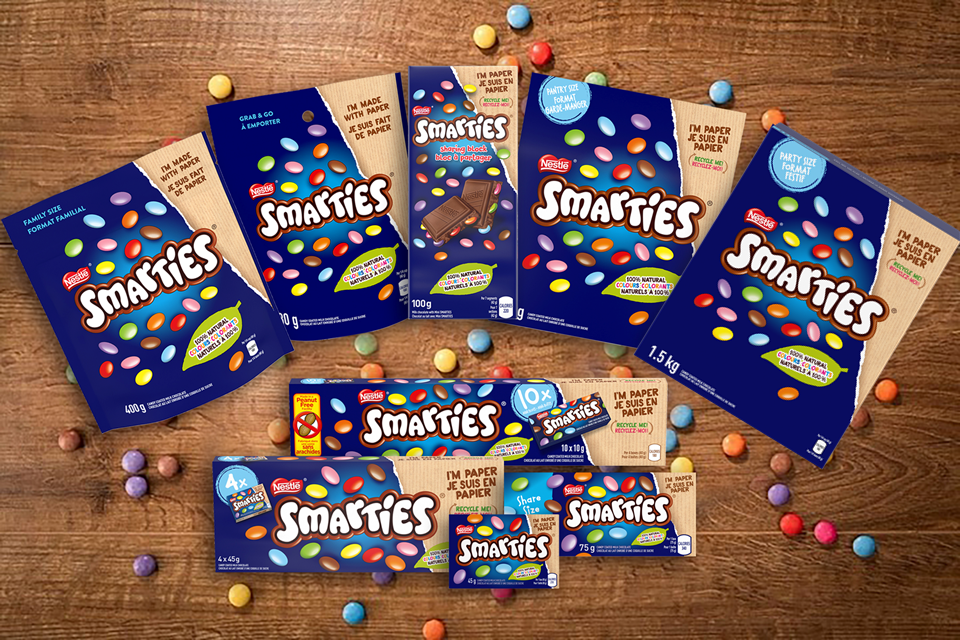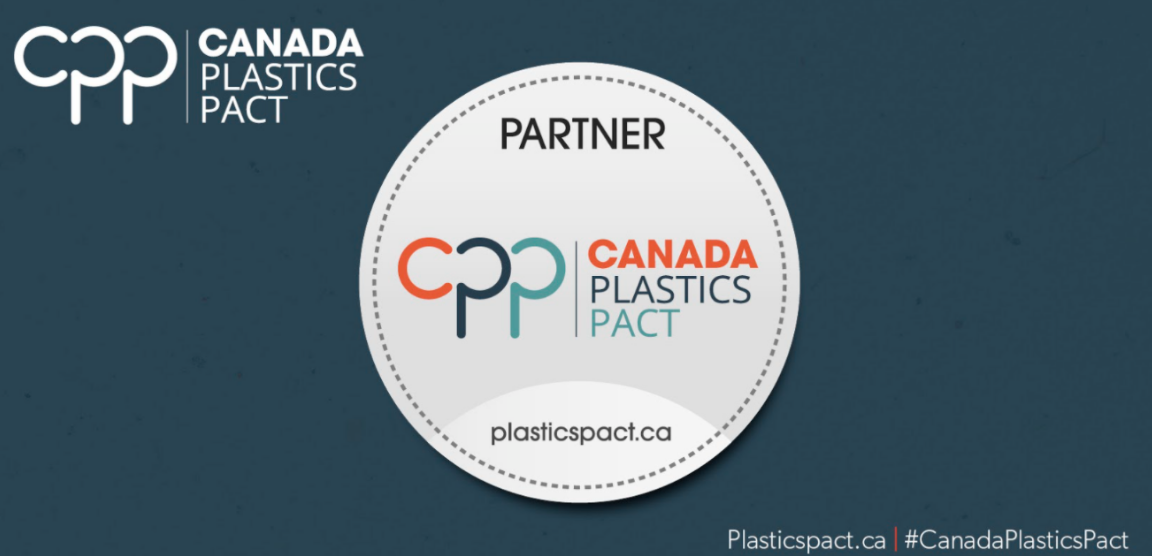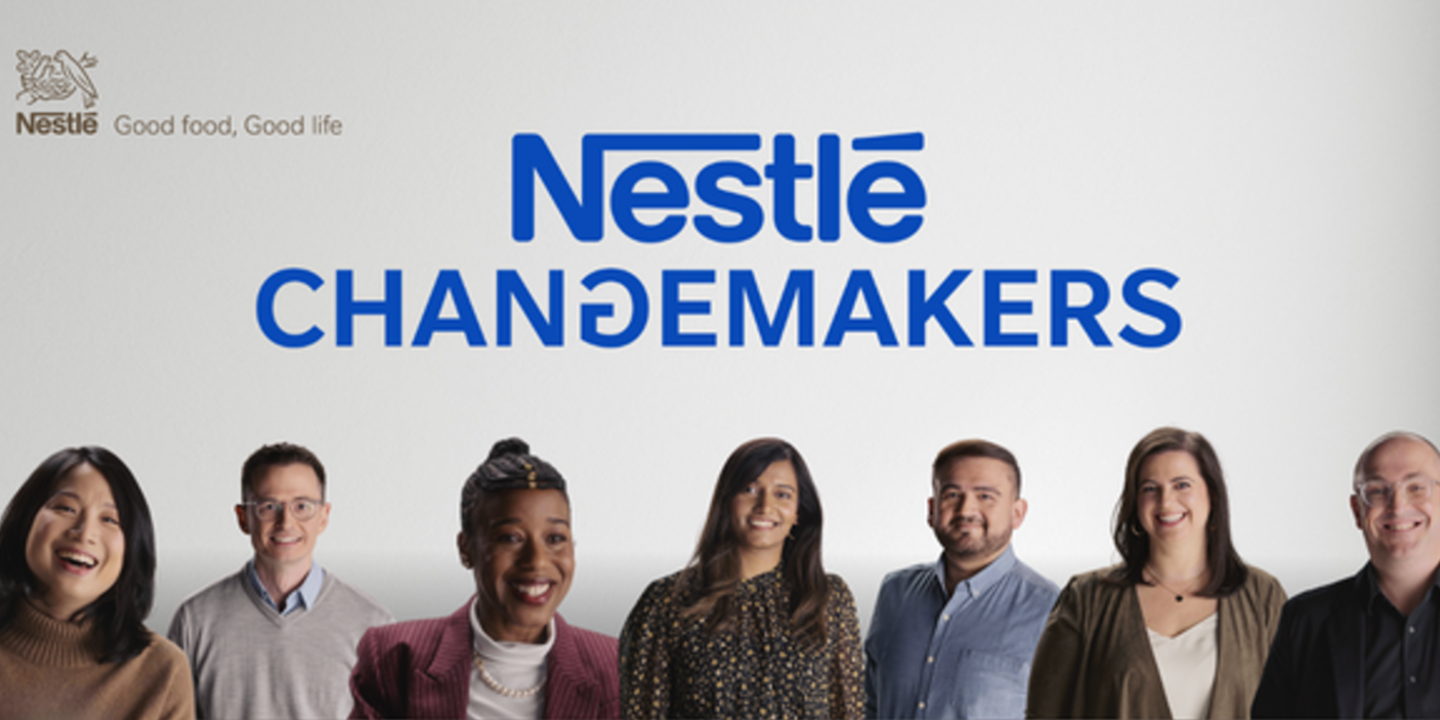At Nestlé, tackling plastic pollution is an urgent priority for us. We are working hard to ensure that none of our product packaging, including plastics, ends up in landfill or as litter, including in our oceans, lakes and waterways.
To achieve this, we are pursuing our commitment for fully recyclable/reusable packaging, progressing towards above 95% Design for Recycling by 2025, with the aim of getting to 100%.
We’ve made a number of global commitments to get there, including the elimination of non-recyclable plastics.
Examples of packaging improvements in Canada include:
- Smarties packaging is now made with responsibly sourced paper, diverting up to 26 tonnes of plastic from Canadian landfills each year.
- Nestlé Real Dairy Ice Cream is one of the first recyclable ice cream containers in Canada.
- Nestlé Good Start Infant Formula is now available in recyclable cans.
- All BOOST® ready-to-drink 237ml meal replacement drinks (High Protein, Original, Plus Calories and Diabetic) have moved to recyclable, reclosable Tetra® Prisma packaging.
However, to tackle the plastic waste crisis we know that our commitments to make our packaging recyclable or reusable alone are not enough.
We are determined to reduce our use of single-use plastics, by introducing reusable packaging, new delivery systems and innovative business models everywhere we operate and sell our products. Building on our commitment, we will reduce the use of virgin plastics by one third by 2025. We are on track to reduce the use of virgin plastic by one third by 2025, having already reduced 8% globally by 2021.
In early 2020, we announced an investment of up to CHF 2 billion to lead the shift from virgin plastics to food-grade recycled plastics, and to accelerate the development of innovative packaging solutions.
Collaboration and collective action are vital for transforming how packaging is managed at end of life, particularly if we are to advance the circular economy. Recognizing this, we opened the Institute of Packaging Sciences in 2019 to enable us to accelerate our efforts to bring functional, safe and environmentally friendly packaging solutions to the market and to address the global challenge of plastic packaging waste.
In addition to the work of the Institute, we are working with value chain partners, industry associations and the civil society to explore different packaging concepts to shape a waste-free future. Such system-wide change takes time, but we are committed to creating a world without waste. Our company will also continue to play an active role in the development of well-functioning collection, sorting and recycling schemes across the countries where we operate.
Improving consumer information is also vital, and we’re committed to helping improve it by labeling our product packaging with recycling information – to help ensure it is disposed of in the right way.
Plastic packaging plays an important role in safely delivering high-quality food and drinks to consumers, and in reducing food loss and waste. We need to consider alternatives carefully before making changes.
We are determined to look at every option to solve these complex challenges and embrace multiple solutions to reduce our environmental footprint.
You may also be interested in
Canada Plastics Pact
On January 27, 2021, Nestlé Canada joined the Canada Plastics Pact (CPP), a collaborative, solutions-driven initiative that brings together industry, government and social organizations from across Canada’s plastics value chain. The goal of the CPP is to drive significant system-wide change towards a circular economy by rethinking the way that we design, use and reuse plastics by 2025.
As a founding partner of the CPP, Nestlé Canada has agreed to collectively make efforts achieving four ambitious goals by 2025:
- Define a list of plastic packaging that is to be designated as problematic or unnecessary and take measures to eliminate them
- Support efforts towards 100% of plastic packaging being designed to be reusable, recyclable or compostable
- Undertake actions to ensure that at least 50% of plastic packaging is effectively recycled or composted
- Ensure an average of at least 30% recycled content across all plastic packaging (by weight)
Canada’s Plastics Pact is the latest country to join the Ellen MacArthur Foundation’s Plastics Pact network, a globally aligned response to plastic waste and pollution. In line with the Ellen MacArthur Foundation’s vision of a circular economy for plastic, the CPP facilitates innovation and knowledge sharing, and drives collaborative action and solutions tailored to Canada’s unique needs and challenges.
To learn more about how we’re optimizing our operations, how are brands are making a difference and commitment from our employees, check out the CSV Snapshot 2021/2022.
Our Footprint
Helping to Protect, Renew and Restore the Environment
At Nestlé, we strive for a more sustainable future towards a healthier planet, a stronger and more responsible society and a thriving economy.
Ultimately, our goal is to leave the world better than we found it. We’re on a sustainability journey and taking action through our new promise: to advance regenerative food systems at scale.
What does this mean? It means that we will go beyond sustainability to help protect, renew and restore the environment, improve the livelihoods of farmers and enhance the well-being of communities and our consumers.
To learn more about how we’re optimizing our operations, how are brands are making a difference and commitment from our employees, check out the CSV Snapshot 2021/2022.
Infant food marketing
International Policy

Nestlé believes in the superiority of breastfeeding and recognizes that the World Health Organization's (WHO) International Code of Marketing of breast milk substitutes is an important instrument for the protection of it, particularly in countries where poor sanitary, economic and social conditions prevail. Read more on the WHO Code of Marketing PDF 136 Kb.
Nestlé sells and markets infant formula products responsibly, and we voluntarily and unilaterally apply the WHO Code in all developing countries. To ensure compliance with the WHO Code, Nestlé has developed a unique global management system, which includes the following aspects. For more information about infant formula download the following documents:
Nestlé in Canada Policy
In Canada, where the WHO Code is not legislated, Nestlé supports the position of Health Canada, the Canadian Paediatric Society and Dietitians of Canada. This position is outlined in the document, Nutrition for Healthy Term Infants, which states that breastfeeding for as long as possible is best, and that formula is appropriate if mothers choose to supplement or discontinue breastfeeding. In addition, Nestlé complies with the Food and Drug Act and Competition Act, which regulate the infant formula here in Canada.
Nestlé WHO Code Quality Assurance System
This has been implemented in all developing countries where Nestlé operates and is built along the lines of ISO quality assurance systems. The manual, outlining Nestlé policies and procedures, gives detailed operational guidelines to all Nestlé employees in their daily conduct of business related to infant formula to ensure compliance at all levels with both the WHO Code of Marketing of breast milk substitutes and local regulations.
Training, testing and compensation on WHO Code knowledge
Nestlé trains relevant Nestlé Nutrition personnel on the WHO Code. They are tested regularly on their knowledge, and their performance is a criterion upon which salary increases and promotions are based.
In 2009, 100% of staff involved in infant formula marketing in developing countries received specific WHO Code training [KPI]; we aim at 100% coverage in any given year, but this may not always be possible due to employee turnover. During the course of 2010, a new web-based training and testing tool was implemented to assess the Code knowledge of all Nestlé Nutrition's medical delegates on a continual basis.
Audits
Nestlé has established a significant program of WHO compliance and monitoring. Corporate auditors check approximately 20 countries every year to verify Code compliances. Any verified Code violation is submitted to the CEO of Nestlé for review and action, and is reported to the Audit Committee of the Board of Directors. The Nestlé system is recognized as best-in-class by social investment groups.
Read more about our implementation of the Code at the Babymilk website.
A message from our Chairman and our CEO

We believe that this 2013 report on Creating Shared Value at Nestlé represents a significant step forward in our drive to communicate transparently with our shareholders and stakeholders about our commitments and progress in all the areas where we engage with society. This report underlines our fundamental belief that for a company to be successful over the long term and create value for shareholders, it must also create value for society. At Nestlé, this begins with the creation of superior long-term value for shareholders by offering products and services that help people improve their nutrition, health and wellness.
Henri Nestlé founded the Company in 1866 on the success of a life-saving infant cereal. Today, we aim to enhance the quality of life of all our consumers by offering tastier and healthier food and beverages, as well as information and services to enable them to make the right choices at all stages of life. And we are investing for the future health and wellness of our consumers through our network of research centres, the Nestlé Institute of Health Sciences and the Nestlé Health Science business. We believe that good nutrition will play an ever more important role in the health and wellness of individuals and society.
Nestlé is all about quality of life and nutrition – that is what we live for as a company. But the relevance of that is the value that it creates: for consumers, for society and for our business – driving competitive advantage and R&D, being ahead of the curve, and building our brand value.”Paul Bulcke
Chief Executive Officer
To build a business capable of both delivering superior shareholder value and helping people improve their nutrition, health and wellness, Creating Shared Value is the approach we take to the business as a whole. In addition to nutrition, we focus on water, because water scarcity is a very serious issue in many parts of the world and water is quite simply the linchpin of food security. And we focus on rural development, because the overall well-being of farmers, rural communities, small entrepreneurs and suppliers is intrinsic to the long-term success of our business.
We continue to actively manage our commitments to environmental and social sustainability, necessary for operating our factories and for the sustainable growth and development of the communities and countries where we operate. With this report, we also restate our support for the UN Global Compact, as a founding member of UN Global Compact LEAD – an important platform for corporate sustainability leadership. We have always believed that in order to prosper we need the communities we serve and in which we operate to prosper as well; and that over the long term, healthy populations, healthy economies and healthy business performance are mutually reinforcing. This involves substantial training and education of people inside and outside Nestlé, as well as large investments in technology with lower environmental impact.

We recognise that our position in society brings both opportunities and responsibilities: to do business in compliance with national laws, international standards and our own values and principles, as expressed in our Code of Business Conduct, Corporate Business Principles and Management and Leadership Principles. For a company like ours to prosper, we must take a long-term view, framed in a robust set of principles and values which have been developed over nearly 150 years. They are based on respect: respect for people, respect for cultures, respect for the environment and respect for the future of the world we live in. Thus, our commitments go beyond simple compliance and are based on common sense values that form the foundation upon which we build our actions in Creating Shared Value.
Last year, we decided to publish a set of forward-looking commitments, covering every part of our business, in order to provide a clear sense of the strategic direction we are heading in and the standards to which we hold ourselves accountable. They are real, they are credible, and we will do everything in our power to make sure they are deliverable. But we know that there will be challenges along the way, and these too we will share with you. In this report, we hope to demonstrate where we are making progress, and where there is more work to be done. We hope this report enables you – our shareholders and stakeholders – to hold us accountable and offer guidance. We have also introduced a number of new commitments and will report on them in future years. We welcome your feedback on this report, on our commitments and our performance.

Cathy: Project Manager, Applications Group
 Name: Cathy Chow
Name: Cathy Chow
Position: Project Manager, Applications Group
Years with Nestlé: Over 17 years
One of my biggest accomplishments so far at Nestlé has been renovating Aero to the new Aero Bubbles chocolate bar you see in stores today. It was an extraordinary experience to have worked with experts across the Nestlé world - from the factory floor to cross-functional teams - sharing best practices and leveraging each other’s expertise to achieve success. It was incredibly rewarding professionally, and certainly something I will never forget.
It’s the opportunity to work with so many different people, with diverse backgrounds and expertise that makes this a great place to work. In my opinion, Nestlé does a great job encouraging employees to share best practices and leverage others’ experiences across the Nestlé world.
Home
Explore Nestlé Canada
-
Community We're working towards making a difference in the communities in which we live and work.Read More
-
Sustainability We’re striving for a more sustainable future, towards a healthier planet, a stronger and more responsible society, and a thriving economy.Read More
-
Brands We have a wide variety of food, beverage and nutrition products to help you and your family live happier and healthier lives.Read More
-
Careers At Nestlé Canada, you'll have the chance to grow in every sense, professionally, personally and intellectually.Read More
Latest Press Releases






